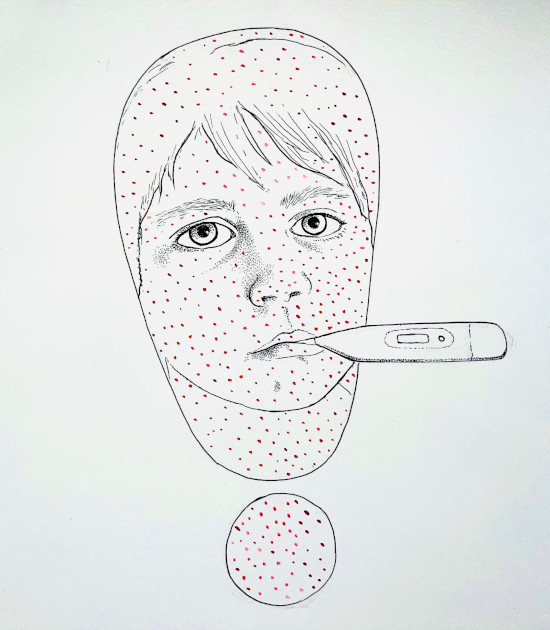Measles cases on the rise in Canada, globally
Experts urge Manitobans to get vaccinated

Illustration by Gabrielle Funk
With measles cases on the rise globally and in some Canadian provinces, Manitobans are being encouraged to protect themselves from the virus before it reaches Manitoba.
While there have been no recorded cases in Manitoba, there are reported cases of the virus in Ontario, Quebec, Saskatchewan and British Columbia. Quebec has seen 12 cases of the measles since the beginning of the year, according to its provincial government.
The best way to protect yourself and others from the highly contagious virus is to get vaccinated, Jackie Neufeld, primary care nurse at Winnipeg’s Aboriginal Health and Wellness Centre, says.
“(Because of COVID), we know how connected the world is and how easily things can cross into different countries,” she says. “This is the time for Manitobans to be doing what they can to ensure they’re protected or to get immunized if they don’t have the protection.”
The first measles vaccine was introduced in 1963, which led to vaccines to protect against mumps in 1967 and rubella in 1969. The three were combined to create the MMR vaccine in 1971. After one dose of the vaccine, recipients have 85 to 95 per cent protection rates, but two doses are needed for nearly 100 per cent protection against the virus.
The last confirmed case of measles in Manitoba was reported in 2019.
“Manitoba is prepared in the event a suspected case of measles is identified within the province and has dealt with cases in recent years,” a provincial spokesperson says in an email statement.
“Manitoba Health has been actively engaged in increasing vaccine uptake in children since it was identified in 2023 that there was a decrease in uptake of routine childhood immunizations due to the pandemic, especially within young children.”
Neufeld agrees that, early in the COVID-19 pandemic, there was a focus on testing for and immunization against that virus. As a result, some children may have missed one or more doses of other vaccines.
Measles symptoms can be similar to those of other viruses and may include fever, runny nose, cough, drowsiness, irritability and red eyes. They can appear seven to 18 days after being exposed to the measles virus.
A red, blotchy rash can show up three to seven days after other symptoms occur, typically starting on the face and spreading down the body.
“By the time that rash starts, you’ve already been highly infectious,” Neufeld says.
People born before 1970 are presumed to have natural immunity to the virus, but healthcare workers, those travelling outside Canada and military personnel should get vaccinated regardless of when they were born.
Children aged 12 to 15 months should receive a first dose of the vaccine, followed by a second dose at 18 months or older.
Roughly one in every 1,000 reported cases of measles results in encephalitis or inflammation of the brain, and about one or three of every 1,000 people who are infected with measles will die from complications, according to the Government of Canada.
Manitobans can check their vaccinationstatus, eligibility and update their vaccines through their primary healthcare provider. Infants and pregnant people are generally not able to get vaccinated.
Published in Volume 78, Number 21 of The Uniter (March 14, 2024)







